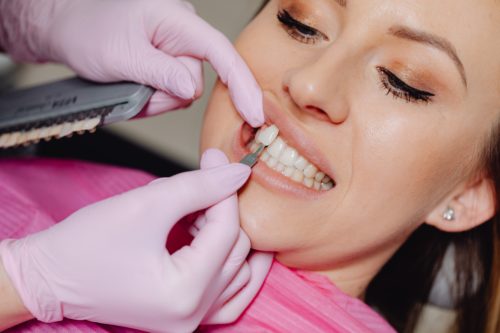
Typically, when individuals are not pleased with the appearance of their smile because of a chipped or discolored tooth, they may seek a cosmetic dental procedure to enhance their smile. Individuals may choose to install porcelain veneers or dental bonding to improve their smile. If you are looking to improve your smile with porcelain veneers or dental bonding, please don’t hesitate to schedule an appointment with a skilled and experienced cosmetic dentistry, dentists located in Basking Ridge & Morristown, NJ. Please read on to learn about the different ways our cosmetic dentistry dentists can help improve your smile.
What is the difference between dental bonding and porcelain veneers?
As mentioned above, individuals may want to alter the appearance of their smile. To do so, an individual may pursue a cosmetic dental procedure where porcelain veneers or dental bonding is adhered to their teeth to enhance their smile. In terms of how they successfully alter the appearance of a smile, porcelain veneers and dental bonding are different. Porcelain veneers are essentially ceramic shells that are glued directly onto an individual tooth. Dental bonding, also referred to as composite bonding, is when a plastic material is adhered with ultraviolet light to “bond” the material to the tooth. Both cosmetic dental procedures fix imperfect smiles. However, there are different benefits to each procedure. When it comes to durability, porcelain veneers are more durable than composite resign. Additionally, porcelain veneers can last for up to 25 years, while dental bonding only lasts for up to 10 years. Porcelain veneers are stain-resistant which helps keep an individual’s teeth white. Unfortunately, sometimes dental bonding it can darken over time. Furthermore, when it comes to the procedures themselves, veneers often require significant enamel removal from the natural tooth. However, dental bonding does not require significant enamel removal from the natural tooth. Regardless of the differences, both porcelain veneers and dental bonding can help improve an individual’s smile.
What is the cost difference?
As mentioned above, veneers can last up to 25 years, while dental bonding may need to be replaced more often overtime. Looking at it from this angle, individuals can save a substantial amount of money if they choose porcelain veneers as they are permanent. On the other hand, dental bonding is completely reversible as it is not a permanent treatment. This means they may break over time causing an individual to have to get them fixed. Additionally, they can darken over time which can cause an individual to have them more frequently overtime to keep their teeth looking white. Typically, an average veneer costs between $900 to $2,000 a tooth. Dental bonding on the other hand costs anywhere from $400 to $800 a tooth.
If you are unhappy with the appearance of your smile, schedule a visit with one of our trusted and knowledgeable team members. Allow our qualified team members to help you improve your smile.






